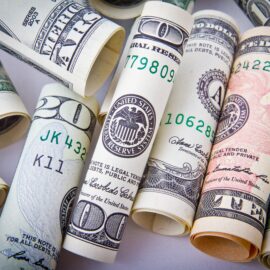

This article gives you a glimpse of what you can learn with Shortform. Shortform has the world’s best guides to 1000+ nonfiction books, plus other resources to help you accelerate your learning.
Want to learn faster and get smarter? Sign up for a free trial here .
What are the best Michael Lewis books to read? What does Lewis typically write about in his best-selling books?
Known for his investigative nonfiction work on important events in financial history, Michael Lewis is the critically acclaimed author of multiple books. Lewis has even expanded beyond financial work by exploring inspirational figures and how they rose to success.
Keep reading for the top 10 Michael Lewis books to get your hands on.
10 of the Best Michael Lewis Books
A few of the best Michael Lewis books have been adapted into box-office hits, including Moneyball, The Blind Side, and The Big Short. Additionally, Netflix has acquired the rights to Flash Boys to make it into a feature-length film. If anything, the success of these films and Lewis’s books show that there’s great interest in rags-to-riches stories and even well-crafted narratives about financial history.
To learn about several of the best Michael Lewis books that have received stellar reviews, read below.
In Flash Boys, Lewis explores high-frequency trading—a poorly-understood threat to your investments, whether you’re investing in a retirement account or day trading. High-frequency trading is electronic trading that uses automated computer algorithms to very quickly buy and sell large quantities of stocks, leading to big financial pay-offs—often at the expense of regular investors who can’t trade in microseconds as the algorithms can. Flash Boys unpacks high-frequency trading—and Wall Street’s greedy response to it—and details one group of traders’ efforts to protect investors from its tactics.
The cynical view of the financial world says that Wall Street is run by a special breed of traders who exploit investors’ collective fear and greed to enrich themselves however they can, without any care for the havoc they might wreak. In Liar’s Poker, Lewis backs up this opinion with a first-hand account of the pursuit of ill-gotten riches at the Salomon Brothers investment firm during the 1980s. As a Salomon employee, Lewis took part in its wealth-chasing culture and witnessed the start of its downward spiral.
Moneyball: The Art of Winning an Unfair Game is the story of the 2002 Oakland Athletics and their general manager, Billy Beane. Beane assembles a winning team on a shoestring budget by using an analytical and scientific approach to evaluate each player’s contributions. Although the A’s have many players with atypical physical attributes and unusual hitting or pitching styles, they excel in overlooked statistical categories, such as on-base percentage, that were typically dismissed by baseball traditionalists. This enables Beane to get maximum efficiency from his team, earning wins at a fraction of the price paid by the rest of the league.
The Big Short: Inside the Doomsday Machine takes us inside the madness, corruption, and greed at the heart of the 2007-2008 financial crisis. It tells the story of an eccentric collection of investors who saw the folly of the subprime mortgage-backed securities market—and found a way to bet against it. By focusing on individuals who saw these worthless securities for what they truly were, The Big Short explores the complexities and irrationalities of modern capitalism. It forces us to seriously question the wisdom (and motivations) of the financial elites who wield so much power over the economy, society, and politics.
Michael Lewis’s The Blind Side is about a black 15-year-old named Michael Oher from the Memphis inner-city projects who beat the odds to become a football star. This story follows Michael’s journey from his impoverished life with his drug-addicted mother to his adoption by a rich white couple in East Memphis. Through the love of his adoptive family, the kindness of strangers, and some significant events in the NFL, Michael was able to find his path to success and became one of the greatest left tackles to play high school and college football in the country.
The human mind is more prone to error than most of us would like to believe. Many of the ways the mind fools itself were discovered by the team of Daniel Kahneman and Amos Tversky, whose research changed how we understand human behavior. At a glance, the two psychologists were opposites in personality and style, yet both had an interest in the workings of the mind and a need to undo our most common misperceptions. During Tversky and Kahneman’s intense collaboration, examined in The Undoing Project, they identified the mental errors that skew our everyday decisions. Their work gave us tools to sharpen our thinking and avoid the unconscious pitfalls of the mind.
Between 2002 and 2008, cheap credit was a tempting phenomenon that permanently changed the financial status of many countries. Boomerang: Travels in the New Third World is more than just a perspective on foreign countries’ dangerous phase in the 2000s—it’s a deep dive into the economic consequences of risky indulgences. Lewis explores these expeditions in cheap financing and how they affected Alaska’s, Germany’s, Greece’s, and Ireland’s society and politics.
The road to the White House is anything but easy. Becoming President of the United States takes a competitive streak, a tough skin, and a charm that wins voters over. Losers: The Road to Everyplace but the White House (originally titled Trail Fever) follows the (mostly) Republican candidates of the 1996 United States presidential election as they build a following and make a name for themselves. What Lewis found on the campaign trail were the heroic yet ridiculous efforts to become the most powerful person in America that ended up just making them losers.
The Real Price of Everything: Rediscovering the Six Classics of Economics is a must-have book for anyone interested in understanding the market and economics. With editorial commentary, Lewis takes a look at six big-name books that explore the history of our economic system. From Adam Smith’s The Wealth of Nations to John Maynard Keynes’s The General Theory of Employment, Interest and Money, get a behind-the-scenes look at the inner workings of our economy.
In Next: The Future Just Happened, Michael Lewis argues that the internet has changed the way people live and think and how they rise to the top of society. More radically, those who now have power aren’t trained or educated professionals with years of experience—they’re often teenagers with a keyboard and a computer. Lewis tells several illustrative stories, including one about a 14-year-old who influenced stock prices in a chat room and another about a rock band that pioneered crowdfunding. Published in 2001, Next is a glimpse of the internet’s early impact on modern society’s power structure.
Final Words
Over the years, Lewis has become a trusted writer that people rely on to tell the truth. Each Michael Lewis book makes its subject fascinating and thrilling enough to keep people reading from the first page to the last.
What other entries belong on our list of the best Michael Lewis books? Let us know in the comments below!

Want to fast-track your learning? With Shortform, you’ll gain insights you won't find anywhere else .
Here's what you’ll get when you sign up for Shortform :
- Complicated ideas explained in simple and concise ways
- Smart analysis that connects what you’re reading to other key concepts
- Writing with zero fluff because we know how important your time is






